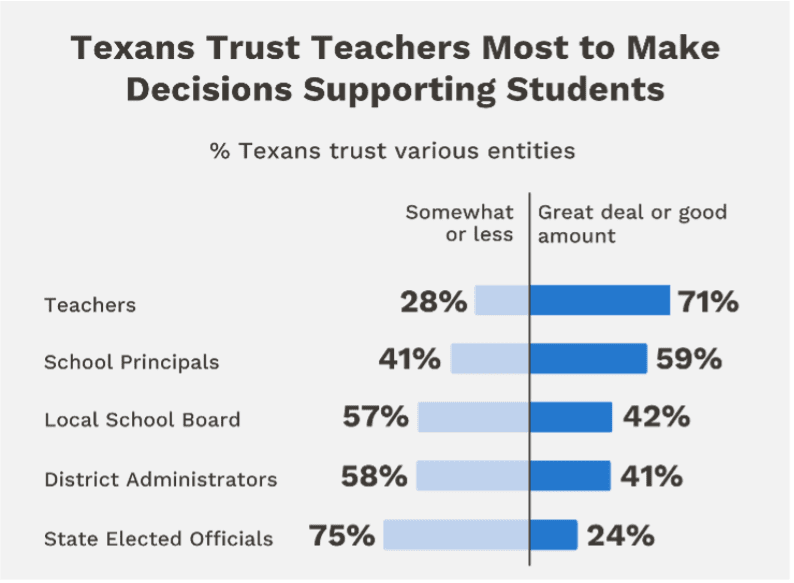View this testimony as a PDF here.
Continuing Statutory Over-Regulation of Curriculum
Last session, despite significant opposition, this body passed SB 3 that upended how social studies is taught in public schools. Rather than heeding the calls made by the Texas Teacher Vacancy Task Force to give more leadership opportunities to classroom educators, HB 2273 does the opposite the task force’s recommendations. Public school educators themselves, in multiple statewide polls, have requested more autonomy in the classroom. This bill continues the statutory over-regulation of public school curriculums despite official and non-official recommendations. This committee should not fuel the attacks on public education with more overregulation of Texas classrooms. Little “conflicts with the principles of freedom and democracy” more than a statutory intrusion into the work of a democratically elected body such as the State Board of Education. While oral history is an excellent method for learning about our collective past, the overly prescriptive application in HB 2273 limits both students and teachers from a nuanced understanding of other people’s lived experiences.
Teachers Want More Autonomy, Not Less
Texas, like most of the nation, is suffering from a severe lack of qualified educators in K-12 public schools, and last year the Texas American Federation of Teachers offered several solutions to this problem. One of them is to guarantee educators the right to use professional judgement when teaching complex and sensitive issues.
Accordingly, the Charles Butt Foundation reported Texas public school parents trust the decisions made by their children’s teachers more than any other entity (see chart below). Legislating the topics discussed in Texas classrooms, as HB 2273 attempts to do, threatens other attempts by this body to address critical teaching shortages and takes away the right of public school parents to trust in the lessons teachers offer their students.

Prescriptive Curriculums Invite Punitive Attacks on Schools
Emma Tenayuca is an example of a historical figure that could be erased by HB 2273. The story of the West Side San Antonio native deserves its place in the Texas public school curriculum. The 1938 Pecan Sheller’s Strike that Tenayuca led in San Antonio is considered one of the first successful efforts by Mexican Americans in Texas to advocate for better pay and treatment in the workplace. While Emma Tenayuca was associated with a Communist organization, she did not conspire to “overthrow” the government. She did organize workers to advocate for themselves and their families. HB 2273 would require public school curriculums to describe her efforts as having been in “conflict with the principles of freedom and democracy,” when in fact Tenayuca’s labor organizing helped create the multiracial democracy we now enjoy.
Texas educators, under HB 2273, could be subject to grievances or complaints for teaching lessons about Emma Tenayuca because the bill broadly and vaguely calls out “communism” as conflicting with acceptable political ideology. More so, by injecting overtly political language into the TEKS, the state places another blinking target on teachers, schools, and districts, for daring to teach commonly known subjects such as Tenayuca and the Pecan Sheller’s Strike. Texas schools are already suffering from being targets of recently empowered activists creating havoc in our communities and do not need more interference from the Legislature.
Vague Directives Limit the Power of Oral History in the Classroom
Oral histories tell us more than what people remember they did, they tell us what a person wanted to happen, what they believed they were doing, and what they think now about their actions in a particular historical moment. All of this could be an important and engaging addition to any classroom curriculum, but the overly prescriptive language in Section 1 of the bill limits the power of oral history to engage students with the lived experience of a person telling their story. The chilling effect already in place after SB 3 and intensified with HB 2273 could limit the sources and narratives available to students simply because of their past involvement or even perceived ties to “communism” or “totalitarianism.” Teachers and schools may think twice, for example, before inviting a speaker to discuss their involvement in the Poor People’s Campaign with Martin Luther King, Jr. Labeling the Poor People’s Campaign as “communist” is a time-tested way to discredit what was a multiracial struggle for economic justice. The vagueness of HB 2273 could easily be used to attack a teacher or school for including people and stories that make oral history so powerful.
More Ammunition for the Next Voucher Fight
HB 2273 is a wolf in wolf’s clothing. It does not solve a real problem experienced in Texas public education, but it will create problems by inserting unnecessary political rhetoric into the Education Code. Enemies of public education could use the language in HB 2273 to question the curriculums, methods, and materials, used by teachers and schools for the sole purpose of seeking damaging headlines and fomenting unnecessary outrage. Texans understand that public education is the tie that binds our state and nation together, and that is why we consistently elect representatives to the Texas Legislature who support public education and reject vouchers. One of the only ways to sway dedicated supporters of public education toward vouchers is to spend millions of dollars tearing down public education. By explicitly calling out “communism” – a descriptor used to attack multiple efforts of the Civil Rights Movement – HB 2273 gives anti-education zealots another stick they can use to beat the piñata of public education. Tearing down public school students, teachers, and schools, is the only way to enact vouchers in a state that supports public education, and we should not allow HB 2273 to contribute to that well-funded, coordinated attack on our most cherished public institutions.
Demonstrate Freedom and Democracy by Rejecting HB 2273
Professional, intellectually honest histories will judge bills like HB 2273, and the larger political fights around vouchers, harshly. When the state injects politics into the curriculum, it places public school communities in the crossfire of anti-public education activists who can exploit the vague, politicized language used in the bill. More so, it demonstrates a dangerous, anti-democratic desire to limit freedom of expression.
One of the great beauties of learning is the feeling of wonder and being mesmerized at the discovery of a counterintuitive fact that challenges a strongly held belief. Overly prescriptive state-mandated curriculums, such as HB 2273, already prevent teachers from presenting complex lessons that represent the lived experiences of Texans. Not only are students being deprived of the richness of Texas and American history and government, but they are also being taught a dangerous lesson that education curriculums can be manipulated to advance political goals such as the enactment of vouchers. The Texas Legislature should honor the democratic process and refuse to involve itself in the work of the SBOE by changing statute to injecting political arguments into the Education Code.
